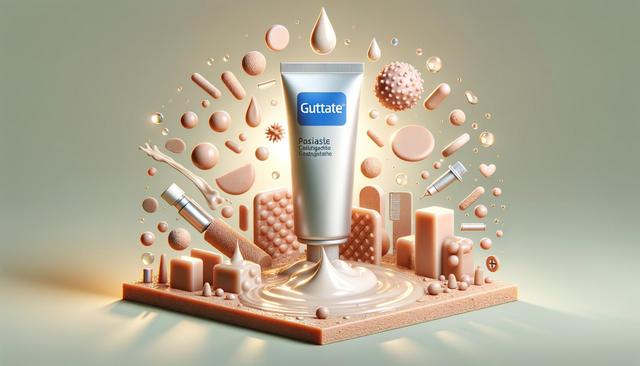Recognizing the Signs and Symptoms of Guttate Psoriasis
Guttate psoriasis often appears suddenly and is typically triggered by infections, especially streptococcal throat infections. It is most commonly seen in children and young adults. The condition is named after the Latin word ‘gutta,’ meaning drop, which accurately describes the small, red, drop-shaped lesions that appear on the skin. These spots usually develop on the trunk, arms, or legs, and sometimes on the scalp. Unlike other forms of psoriasis, guttate lesions are usually not as thick and scaly.
Common symptoms include:
- Small, red, drop-like spots on the skin
- Mild scaling or flaking in affected areas
- Itching or discomfort
- Spots that may gradually fade or evolve into another type of psoriasis
In some cases, individuals may experience a flare-up after a sore throat or upper respiratory infection. Notably, this form of psoriasis does not typically affect the nails or joints, unlike other types such as plaque psoriasis or psoriatic arthritis.
Potential Triggers and Risk Factors
Although the exact cause of guttate psoriasis is not fully understood, it is believed to involve a combination of genetic and environmental factors. The immune system plays a central role, mistakenly attacking healthy skin cells and causing inflammation. Several triggers can prompt the onset or worsening of guttate psoriasis, especially in those with a family history of psoriasis.
Key triggers include:
- Streptococcal throat infections
- Stress or emotional upheaval
- Skin injuries or sunburn
- Certain medications, such as beta-blockers or antimalarial drugs
- Rapid withdrawal of corticosteroids
Understanding these triggers can help individuals take preventive measures. For instance, treating strep infections promptly may reduce the likelihood of a guttate flare-up. Maintaining a healthy lifestyle and managing stress levels can also be beneficial in minimizing episodes.
Medications Commonly Used in Treatment
There are several treatment options available for managing guttate psoriasis, depending on the severity of the symptoms and individual patient factors. In mild cases, the condition may resolve on its own without the need for extensive treatment. However, medical intervention is often recommended to relieve symptoms and prevent recurrence.
Common medications include:
- Topical corticosteroids: Reduce redness and inflammation
- Vitamin D analogs: Help slow skin cell growth
- Coal tar-based treatments: Aid in reducing scaling and itching
- Phototherapy (UVB light): Effective for widespread lesions
In cases associated with a bacterial infection, antibiotics may be prescribed to eliminate the underlying cause. Systemic medications are sometimes used for more severe or persistent cases, although they are typically reserved for short-term use due to potential side effects.
Non-Medication-Based Management Strategies
In addition to medical treatment, individuals with guttate psoriasis can benefit from various non-pharmacological approaches to manage their condition. These strategies focus on improving skin health, reducing triggers, and supporting overall well-being.
Helpful strategies include:
- Using gentle, fragrance-free skin care products
- Applying moisturizers regularly to prevent dryness
- Taking warm (not hot) baths with colloidal oatmeal or Epsom salts
- Avoiding known triggers such as stress or skin trauma
- Following a balanced diet rich in anti-inflammatory foods
Exposure to natural sunlight in moderation can also help some individuals, as ultraviolet light has been shown to slow down the overactive skin cell production. However, it is vital to avoid sunburn, which can worsen symptoms. Emotional support, such as counseling or support groups, may also be valuable in coping with the psychological impact of the condition.
When to See a Healthcare Professional
While guttate psoriasis can sometimes resolve without treatment, it is advisable to consult a healthcare provider for an accurate diagnosis and appropriate care. A dermatologist can help determine whether the condition is guttate psoriasis or another skin disorder with similar symptoms, such as pityriasis rosea or eczema.
Seeking professional guidance is especially important when:
- The rash is widespread or worsening
- There is significant discomfort or itching
- Symptoms persist for more than a few weeks
- There are signs of infection, such as warmth or pus
Healthcare providers may recommend a skin biopsy or throat swab to confirm the diagnosis. They can also tailor a treatment plan that considers the individual’s medical history, lifestyle, and preferences. Early and appropriate treatment may help prevent progression to other forms of psoriasis or reduce the frequency of flare-ups in the future.
Conclusion: Navigating Life with Guttate Psoriasis
Guttate psoriasis, though often sudden in onset, is a manageable condition with the right combination of awareness, treatment, and lifestyle adjustments. Recognizing early signs, understanding potential triggers, and exploring both medical and non-medical approaches can empower individuals to take control of their skin health. Regular communication with healthcare providers, along with self-care and stress management, plays a key role in managing flare-ups and maintaining quality of life. Taking a proactive approach can make a meaningful difference for those living with this form of psoriasis.


